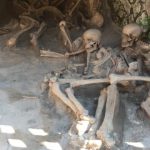Remains of the inhabitants of Herculaneum, who took shelter in the coastal buildings during the Vesuvius eruption.
In 1981, human skeletons from the 1st century CE were dug out in Herculaneum. In total, there were 55 skeletons (30 adult men, 13 adult women and 12 children). The discovery was found on the beach, in the chambers for boats near the shore. As only a few skeletons were found earlier, it was thought that almost all residents of the city were able to escape before the cataclysm. However, the discovery of 1981 changed the view of scientists.
Residents of Herculaneum, waiting on the shore for rescue from the sea, died suddenly as a result of the impact of strong heat – about 500°C. High temperatures caused limbs to contract and bones or teeth to break.
It is worth noting that the find is so valuable as till the third century, the Romans cremated the corpse and only a few human remains from that period have survived to our times.







